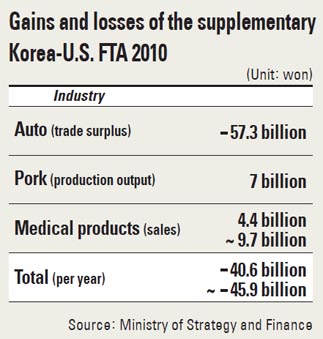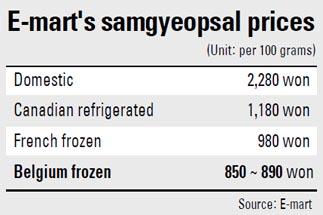
Market Information > 한국 농식품 시장뉴스
한국 농식품 시장뉴스
July 25, 2011
2011.07.25
1. BILATERAL/MULTILATERAL ISSUES
Additional KORUS FTA Negotiations Resulted in Reduced Exports of Automobiles by 57.3 Billion Won Per Year [Korean: BYK]
http://news.naver.com/main/read.nhn?mode=LSD&mid=sec&sid1=101&oid=003&aid=0003981189
Summary: The additional KORUS FTA talks that took place in December 2010 will reduce automobile exports to the United States by 57.3 billion won per year. However, the additional talks will reduce the loss in pork and pharmaceutical area by 11.4~16.7 billion won. Thus, total reduction in benefits from KORUS FTA will be dropped by 40.6~45.9 billion won per year due to the additional KORUS FTA negotiations.
Renegotiated Korus FTA to cost Korea about $38M [English, CSY]

Ratify the Korus FTA in August[English, KJH]
http://joongangdaily.joins.com/article/view.asp?aid=2939318
Full text: After the ruling Grand National Party vowed to ratify the Korea-U.S. free trade agreement in August, the opposition Democratic Party strongly demanded a renegotiation of the pact, citing 10 clauses that it argues need revision. The DP pushed for a deferment of tariffs on U.S. beef and a recognition of goods produced at the inter-Korean industrial park in Kaesong, North Korea, as South Korean products.
The situation in the U.S. is not amicable either, as politicians are prioritizing the financial crisis over ratification of the pact. If the current situation continues on both sides, the long-awaited ratification will likely drift along with no noticeable results.
The DP should understand how unrealistic its demands are. Nine of the 10 clauses the party wants to renegotiate are the ones it had agreed to with the U.S. when it was the ruling party under the Roh Moo-hyun administration. The DP’s transformation, which is primarily due to hard-line opposition, translates into a pure political and ideological offensive. If the DP insists on making unreasonable demands in consideration of a potential alliance with the Democratic Labor Party or other liberal civic groups for next year’s general and presidential elections, it can never be free from criticism that it is using the FTA for its own political advantage.
It would be best for both parties to ratify the pact, as junior members of the GNP want. Yet it would still be half of a success if the FTA were ratified by the GNP alone - with the opposition parties absent from the voting as they were in the May ratification of the Korea-EU FTA.
The Korus FTA is not something to be determined by partisan interests. That’s an unavoidable consequence for a small open economy like Korea. It is also why the pact was initiated by President Roh, an anti-U.S. politician, and supported by Sohn Hak-kyu, the current DP chairman and the governor of Gyeonggi at the time, who gladly chimed in. If this continues, the documents both governments signed in June 2007 may end up as scrap paper.
The best option is to ratify the pact in August. If the U.S. delays ratification until September, yet presents a clear roadmap for its passage, we won’t have to postpone the ratification. The determination of President Lee Myung-bak and President Barack Obama is also crucial for a smooth ratification of the pact. The junior lawmakers of the GNP must also approach the issue as boldly as possible because our national interest is at stake. Seventy-five percent of the public supports the pact. That says it all.
2. LIVESTOCK ISSUES
Dairy Farms and Processors are in Dispute over Price of Raw Milk [Korean, OSY]
http://www.hankyung.com/news/app/newsview.php?aid=2011072468551&sid=0104&nid=004<ype=1
Summary: Dairy farms and processors are disputing over the price of raw milk. Dairy farms are demanding minimum 24 percent increase in ex-farm price, while processors argue that 6 percent increase should be enough. Current price of raw milk that farms receive from the processors is 704 won per liter, which was fixed over the last three years according to the Korea Dairy Farms Association. As the negotiation with the suppliers does not progress, farmers are planning to stage a nation-wide demonstration, including a mass gathering of farmers in Yeoido, Seoul on July 26. The price of raw milk has been decided by the Ministry of Ag based on industry hearings every three to five years when there was a reason to adjust the price by more than 5 percent.
Slowly but surely, pork from EU enters market [English, CSY]

Number of Hanwoo Beef Cattle Mark Historical High Inventory [Korean: BYK]
http://www.ytn.co.kr/_ln/0115_201107250012147166
Summary: The number of Hanwoo beef cattle marked 3.05 million heads, which is the highest since Korea began collecting the inventory records in 1976. This is about half million higher than the normal demand level. The reason for continued drop in Hanwoo prices is due to an increase in calf numbers 3 years ago when Hanwoo prices were high while slaughtering was delayed due to the FMD outbreak in late 2010 through early 2011.
3. NORTH KOREA ISSUES
Secretary Clinton invited Mr. Kim, Gye Gwan, (Korean: CSC)
http://www.ytn.co.kr/_ln/0104_201107242114359143
Summary: Secretary Clinton invited Mr. Kim, Gye Gwan, First Vice Minister of Foreign Affairs in DPRK to the United States. He is expected to visit the U.S. in the weekend to discuss the matters of DPRK nuclear and food aid with U.S. pertinent high level officials.
4. OTHER MISCELLANEOUS ISSUES
Food makers yield, agree to expand MSRP labels [English, CSY]
http://joongangdaily.joins.com/article/view.asp?aid=2939255
The information in this report was compiled by the Agricultural Trade Office (ATO) at the U.S. Embassy in Seoul, South Korea. The press summaries contained herein do NOT reflect USDA, the U.S. Embassy, or other U.S. government agency official policy or view point. U.S. food exporters can learn more about market opportunities in South Korea by reviewing ATO Seoul’s Exporter Guide and other reports available at www.fas.usda.gov by clicking on “attaché reports”.
Agricultural Trade Office, U.S. Embassy - Seoul
Tel: 82-2-6951-6848 Fax: 82-2-720-7921
Email: atoseoul@usda.gov